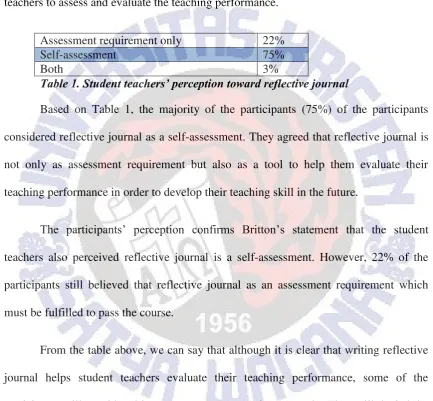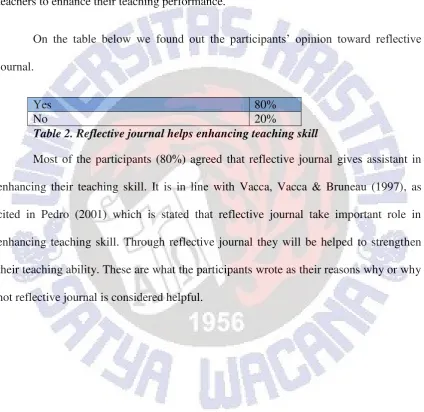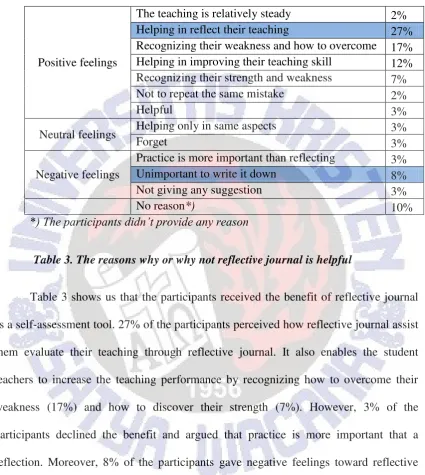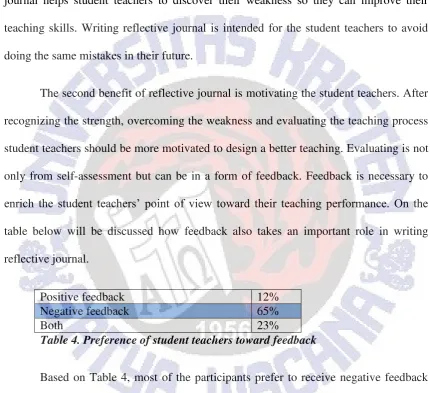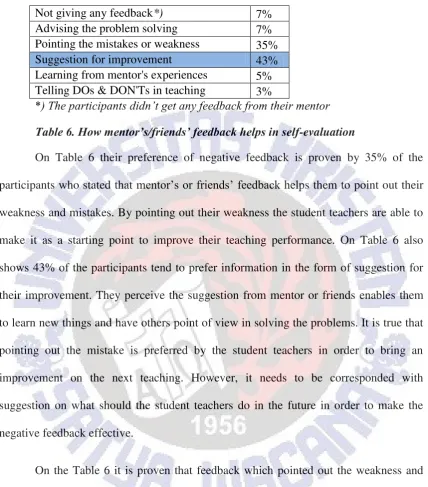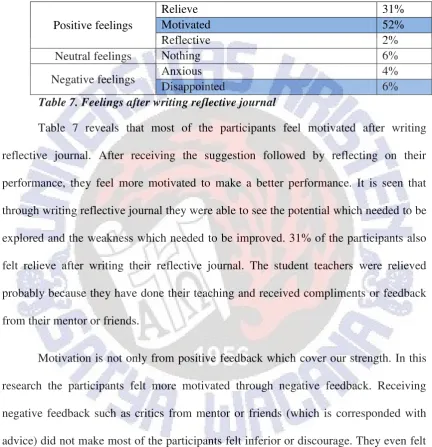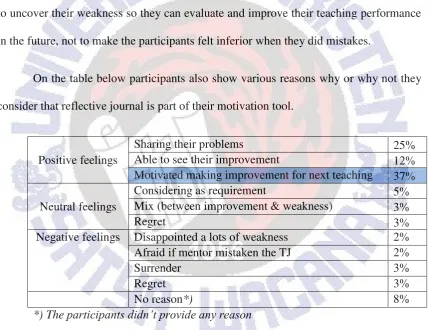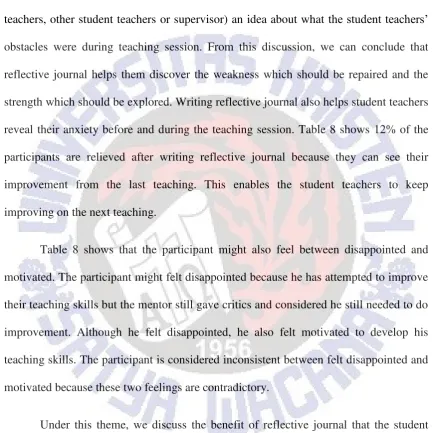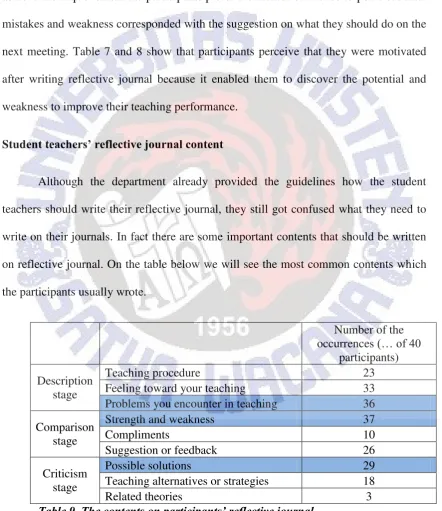1
STUDENT TEACHERS’ PERSPECTIVES TOWARD TEACHING
JOURNAL
THESIS
Submitted in Partial Fulfillment of
The Requirements for the Degree of Sarjana Pendidikan
Fajarini Prihastuti 112012041
ENGLISH LANGUAGE EDUCATION PROGRAM
FACULTY OF LANGUAGE AND LITERATURE
SATYA WACANA CHRISTIAN UNIVERSITY
SALATIGA
5
COPYRIGHT STATEMENT
This thesis contains no such material as has been submitter for examination on any course or accepted for the fulfillment of any degree or diploma in any university. To the best of my knowledge and my belief, this contains no material previously published or written by any other person except where due reference is made in the text.
Copyright@2016. Fajarini Prihastuti and Anita Kurniawati, M. Hum
All right reserved. No part of this thesis may be reproduced by any means without the permission or at least one of the copyright owners or the English Language Education Program, Faculty of Language and Literature, Satya Wacana University, Salatiga.
7 The Definition of Reflective Journal ……… 13
The Roles of Reflective Journal ………... 13
Enhancing Teaching Quality through Reflective Journal ……… 14
Reflective Journal as a Motivation Tools ……… 15
The Content in Writing a Reflective Journal ……….….. 16
8
Findings and Discussion ………. 20
Conclusion ……….. 34
Acknowledgement ………..… 37
References ………... 41
9
STUDENT TEACHERS’ PERSPECTIVES TOWARD TEACHING JOURNAL
Fajarini Prihastuti
ABSTRACT
This research aims to investigate the student teachers‟ general perceptions of reflective journal. The participants of this research were 40 student teachers in English Language Education Program of Satya Wacana Christian University who taught in junior high schools. In this research, the data were collected using the questionnaire. The result revealed that the majority of participants considered reflective journal as a self-assessment tool which helps them improve their teaching performance. They also considered it as a motivation tool which enables them to share their feelings and problems they encountered during teaching session. Regarding the reflective journal‟s contents, student teachers included some important contents which are describing, comparison and criticism stage. On the describing stage they shared their feelings and problems they encountered. On comparison stage they included their strength and weakness and mentor‟s or friends‟ feedback. On criticism stage they shared possible solution to the problems the encountered and the teaching strategies they used. There were only few of the student teachers who included the related theories on their reflective journal which was meant to help them monitor and generate their improvement in teaching process.
Keywords: Student teachers’ perception, teaching journal, reflective journal
INTRODUCTION
There are some ways for teacher to improve their teaching ability, such as joining trainings for new teachers and the educational seminars where the teachers may have new experiences, knowledge and teacher partners that they can share new experience with. Writing reflective teaching also becomes one of the ways to improve teachers‟ teaching ability. Richards and Lockhart (1996) as cited in Fatemipour and
10
teaching practices, and use the information obtained as a basis for critical reflection about teaching"(p.1). Based on Richards and Lockhart‟s statement we may say that by
critically reflect on our previous experiences in teaching we can learn how our teaching process went on. To comply the statement teachers should reflect on their teaching process continuously. Farrell (2005), as cited in Farrell (2015) mentions that teachers need to “shape and reshape” their knowledge about teaching learning process during
their careers as a teacher. From this statement teachers or student teachers also need to develop their teaching skills, one of the methods is through reflecting or writing reflective journals.
As student teachers who have limited experiences in teaching, reflection could be one of the important things to improve the teaching ability. Through reflection, some questions regarding our teaching process should come up on our mind. These questions could be about the teaching technique we used, the materials, the classroom management or the assessment we gave to the students. Maarof (2007) stated that writing a reflective journal will assist student teachers “in evaluating their teaching, in
terms of strengths and weaknesses”. Reflective journal will help us fix our next teaching
which means improving our teaching process and learning from our mistakes. Moreover, Fendler (2003) as cited in Suratno and Iskandar (2010) stated that “reflection is considerably beneficial practice to support teacher professional development and teachers‟ efforts to improve student learning”. Thus, reflective journal become one of
11
In our department, English Language Education Program (ELEP), student teachers are required to write a teaching journal as a follow up action after teaching. Basically teaching journal in our department has the same concept like reflective journal. The teaching journal should be written right after teaching session and will be archived. By the end of teaching practicum program the teaching journals should be included in the teaching portfolio and will be used as an evaluation for the teacher mentor. Student teachers are required to write teaching journal so they will be able reflect on the student teachers‟ teaching skills development.
In writing teaching journal, however, my friends and I were confused what we should write on our teaching journal. We usually simply wrote down what the mentor or friends said regarding our teaching process. In fact, the teaching journal is not only sourced from mentor‟s comments or suggestions. We can do self-assessment. By
reflecting, we also learn how to think critically since when we have become a teacher they will not find a mentor or peers who will assess or give comments. Based on the fact that writing teaching journal confused me and my friends, through this research we will discover student teachers‟ opinion toward teaching journal. How actually teaching
12
The aims of this study are to discover what student teachers‟ general opinion of
reflective journal. As Fendler (2013), as cited in Suratno and Iskandar (2010) stated that reflection is considered beneficial to support teaching development, from this research we can discover how reflective journal could help student teachers develop their teaching skills.
This research also has significance to help student teachers to be more aware of reflective journals‟ benefit. Through this research hopefully the supervisor or faculty could encourage the student teachers to produce the beneficial reflective journal for the student teachers.
Regarding the benefit of reflective journal discussed previously, through this research we will able to know “What are student teachers‟ of ELEP perspectives toward reflective journal in Teaching Practicum?” Through this research question we will be
able to know what are the student teachers‟ opinion toward reflective journal, whether they have positive or negative opinion of reflective journal.
LITERATURE REVIEW
Through this literature review I will start my discussion with definition of reflective journals and the benefit of reflective journals. For the reflective journals‟
13 The Definition of Reflective Journal
Australian Physiotherapy Council (2006) as cited in Edgar (2013) defined reflective as an „intentional activity‟ of a person to describe and analyze their thought, feelings and behaviors and make judgment about their effectiveness. The same opinion, Britton (n.d) stated that reflective is a combination of “self-awareness, critical thinking and analytic ability” which is done continuously for their learning process. Through
problem analysis which is done continuously, student teachers are able to think of the teaching alternatives to bring an improvement for the teaching practices.
From these definitions above, reflective is not simply a text which tells the reader about what happen in our teaching process but also how we overcome the problem that appeared while we are teaching. More than that describing the feelings, critical thinking and analytic ability is needed in writing a reflective journal.
The Roles of Reflective Journals
According to Russell (2005) reflective practice became an important role to enable students in preparing them to face the real situation as a professional teacher. By analyzing and thinking critically toward their teaching, student teachers are expected to prepare themselves as a professional teacher such as managing the classroom effectively and motivating the students (Rodriguez and McKay, 2010)
14
Practicum) probably they still got feedbacks or evaluation from the mentor teacher or peers but in real teaching they have to be able to assess or evaluate by themselves. Therefore, during the pre-service program student teachers need to be familiarized with reflection practices by writing the reflective journals continuously.
Enhancing Teaching Quality through Reflective Journals
Reflective journals play an important role in helping student teachers to improve their teaching ability. Vacca, Vacca & Bruneau (1997) as cited in Pedro (2001) stated that through reflection it will assist the student teachers to strengthen their teaching ability. By analyzing and evaluating the teaching practice they will be more aware of the problems and how to deal with them.
According to Rodman (2010) reflective practice may also help the student teachers evaluate and develope teaching strategies. From the experiences which are expressed on the reflection, student teachers are able to learn and plan what approach or method that they should use. From this reflection, the student teachers can use the appropriate method or approach based on the students needs‟.
In line with Rodman‟s statement, Cengiz & Karatas (2015) also agreed student
teachers could evaluate their teaching and discover their students‟ weakness. Student
15
Reflective Journals as a Teaching Motivation Tools
In addition, reflective journals may be considered as a motivation tool for the student teachers. We are aware that reflective journals may contain our weakness or problem while teaching. However, Ghaye (2011) stated that in reflective journals we also need to reflect our positives values, which may lead to „amplify our gifts, talents
and strength‟. From Ghaye‟s statement we may say that reflective journals not merely
about problem solving media or a tool to point out our weakness but also a motivation to student teachers where they can show their talents or strength in teaching process. By knowing their strengths they will be more confident to teach
Clarke (n.d) also agreed when the student teachers includes the positive feedbacks from the mentor on the reflective journals it could motivate and encourage them to improve their teaching. The student teachers will be more aware of their strength and positive values within them. The reflective journals which contain of positive values would help the student teachers to motivate themselves or even the readers. Fredrickson (2001) has the same opinion that positive feelings such as compliments from our mentor or pairs, make us more open-minded. It means we can be more receptive to new ideas and alternatives that would bring a transformation to our future teaching progress.
Fishbach, Eyal & Finkelstein (2010) also say that positive feedbacks may increase student teachers‟ confidence. It means they are able to carry out their mission
16
feedbacks also signal that the student teachers keep the commitment in enhancing their teaching.
The Content in Writing a Reflective Journal
In order to achieve practical reflective journals there should be a clear guideline for student teachers in writing reflective journals. Iwaoka (2007) stated that reflective journals should contain the short summary of our teaching, reflection upon our teaching and possible solutions toward the problem which may rise in class. Our reflections have to be original from our own thought and as critical as possible. Critical here means constructive for our next teaching activities. Jay and Johnson (2002) as cited in Fatemi, Shirvan & Rezvani (2007) also have the same thoughts that the reflective journals should consist of three important things which are „description, comparison and
criticism.‟ The description stage, we need to formulate the problem that we faced. In
comparison stage, we also need to open our mind toward others‟ opinion or different point of views. The last stage basically is a critical thinking and decision making of our problem. How we can design an alternative way of our teaching process.
Skill Development Team (2012) stated that in writing reflective journals we can start with „description, interpretation or analysis and outcome or evaluation‟. In
17
happen in the classroom and link it to the related theory. In the last stage, outcome or evaluation we can share what we already learned and if there is any changes we make to improve our teaching process.
THE STUDY
Context of the study
This research was done in English Language Education Program (ELEP) in Faculty of Language and Literature (FLL) of Satya Wacana Christian University. ELEP was seen as a program which always yields the best English teacher candidates. ELEP was chosen because in this program the student teachers are required to write reflective journal after they finish teaching during their Teaching Practicum. In Teaching Practicum the participants also experienced how to deal with the classroom management and the real students with the variety of characteristic.
Participants
18
junior high schools are required to “provide a more stimulating and interactive classroom environment”. This environment in classroom enables the students to
“develop their ability in forming opinions, making decision and drawing conclusion”
(Ganeson, 2006). Junior high school students are in the starting point where they start to develop their cognitive ability such as critical thinking. Junior high school students‟
cognitive development will also be influence with their learning environment like the teachers or student teachers. Therefore, as student teachers in junior high school the participants are also expected to be part of the students‟ development. In this research
purposive sampling was used to select the participant because this research requires the participant with the certain criteria as already mentioned previously.
Data Collection Instruments
19
to share their perspectives toward reflective journal as much as possible to help the researcher get the richer data.
There was 7 question items in the questionnaire. Question number 1 and 2 would enable the researcher to find out the general perspective of the participants toward reflective journal and its benefit. On the questions 3 and 4 would discover about the content of their reflective journal and what the problems they analyzed on the reflective journals. On number 5 and 6 the participants would be given the questions which enable to find out their preference of feedback and how the feedback from mentor or pair could help them evaluate their teaching performance. On the last question, number 7, the participants could share their feelings after finish writing reflective journal. Did they perceive motivated, relieve or probably disappointed after writing reflective journal. The consent form was also provided where participants were requested to write their name, age, phone number and willingness if the researcher needs more information.
Data Collection Procedures
20
items were revised and improved to get the richer and reliable data which were able to answer the research question. The final questionnaires were distributed to the 40 participants without including the participants who were involved in the pilot study.
Data Analysis Procedures
After receiving the questionnaires from the participants, they were numbered. After the questionnaires were numbered, for the close-ended questions the researcher calculated the answers in percentage and displayed it in the form of table. Meanwhile, for the open-ended questions (including the reasoning questions) the researcher read about 4 times per question in order to understand the answers and categorized the same answers. After categorizing the answers, the data was calculated in percentage and displayed it on the table. Then, the researcher decided to categorize the data based on the themes. After categorizing the answers based on the themes, the result with the highest number would be related with the theories which already discussed previously, whether it confirmed or was contrary to the theories.
FINDINGS AND DISCUSSION
21
Student teachers’ general perception of reflective journals
Britton (n.d) stated that reflective journals are considered as a self-assessment tool. Not only as an assessment requirement, reflective journal enables pre-service teachers to assess and evaluate the teaching performance.
Assessment requirement only 22%
Self-assessment 75%
Both 3%
Table 1. Student teachers’ perception toward reflective journal
Based on Table 1, the majority of the participants (75%) of the participants considered reflective journal as a self-assessment. They agreed that reflective journal is not only as assessment requirement but also as a tool to help them evaluate their teaching performance in order to develop their teaching skill in the future.
The participants‟ perception confirms Britton‟s statement that the student
teachers also perceived reflective journal is a self-assessment. However, 22% of the participants still believed that reflective journal as an assessment requirement which must be fulfilled to pass the course.
22
The benefits of writing reflective journal according to student teachers
There are two main benefits of reflective journal that will be discussed based on this research. The first one is how the reflective journal gives assistant for student teachers to enhance their teaching performance.
On the table below we found out the participants‟ opinion toward reflective journal.
Yes 80%
No 20%
Table 2. Reflective journal helps enhancing teaching skill
23 Positive feelings
The teaching is relatively steady 2% Helping in reflect their teaching 27% Recognizing their weakness and how to overcome 17% Helping in improving their teaching skill 12% Recognizing their strength and weakness 7% Not to repeat the same mistake 2%
Helpful 3%
Neutral feelings Helping only in same aspects 3%
Forget 3%
Negative feelings
Practice is more important than reflecting 3% Unimportant to write it down 8% Not giving any suggestion 3%
No reason*) 10%
*) The participants didn’t provide any reason
Table 3. The reasons why or why not reflective journal is helpful
24
The table above shows us that the majority of participants have positive feelings toward reflective journal. However, 3% of the participant was considered that more practice is important than writing reflective journal. In fact, we know that reflective journal helps student teachers to discover their weakness so they can improve their teaching skills. Writing reflective journal is intended for the student teachers to avoid doing the same mistakes in their future.
The second benefit of reflective journal is motivating the student teachers. After recognizing the strength, overcoming the weakness and evaluating the teaching process student teachers should be more motivated to design a better teaching. Evaluating is not only from self-assessment but can be in a form of feedback. Feedback is necessary to
Table 4. Preference of student teachers toward feedback
25
Negative FB helps the student teachers recognize the weakness 80% Positive FB is motivating the student teachers 12% Negative FB is motivating the student teachers 2% Positive/negative helps in evaluate their teaching practice 3%
No reason*) 3%
*) The participants didn’t provide any reason
Table 5. The reasons why student teachers prefer negative or positive FB
26
Not giving any feedback*) 7% Advising the problem solving 7% Pointing the mistakes or weakness 35% Suggestion for improvement 43% Learning from mentor's experiences 5% Telling DOs & DON'Ts in teaching 3%
*) The participants didn’t get any feedback from their mentor Table 6. How mentor’s/friends’ feedback helps in self-evaluation
27
participants‟ feelings after they write reflective journal and their reasons will be
displayed.
Negative feelings Anxious 4%
Disappointed 6%
Table 7. Feelings after writing reflective journal
Table 7 reveals that most of the participants feel motivated after writing reflective journal. After receiving the suggestion followed by reflecting on their performance, they feel more motivated to make a better performance. It is seen that through writing reflective journal they were able to see the potential which needed to be explored and the weakness which needed to be improved. 31% of the participants also felt relieve after writing their reflective journal. The student teachers were relieved probably because they have done their teaching and received compliments or feedback from their mentor or friends.
Motivation is not only from positive feedback which cover our strength. In this research the participants felt more motivated through negative feedback. Receiving negative feedback such as critics from mentor or friends (which is corresponded with advice) did not make most of the participants felt inferior or discourage. They even felt more motivated to improve and develop their teaching skills.
28
didn‟t have tendency to agree or refuse the fact that reflective journal is motivated for
the student teachers.
Although most of the participants were motivated and relieve, some of the participants felt disappointed anxious after writing their reflective journal. It might happen when the participants doing the mistakes or experience decadence compare to the previous teaching. In fact, writing reflective journal is intended for the participants to uncover their weakness so they can evaluate and improve their teaching performance in the future, not to make the participants felt inferior when they did mistakes.
On the table below participants also show various reasons why or why not they consider that reflective journal is part of their motivation tool.
Positive feelings
Sharing their problems 25%
Able to see their improvement 12% Motivated making improvement for next teaching 37%
Neutral feelings
Considering as requirement 5% Mix (between improvement & weakness) 3%
Regret 3%
Negative feelings Disappointed a lots of weakness 2% Afraid if mentor mistaken the TJ 2%
Surrender 3%
Regret 3%
No reason*) 8%
*) The participants didn’t provide any reason
Table 8. The reasons why or why not the reflective journal is motivated
29
because they have a vision how to make their teaching better than the previous teaching. Writing reflective journal also enables them to share about the problems which they encounter during teaching session. This would give the readers which could be mentor teachers, other student teachers or supervisor) an idea about what the student teachers‟ obstacles were during teaching session. From this discussion, we can conclude that reflective journal helps them discover the weakness which should be repaired and the strength which should be explored. Writing reflective journal also helps student teachers reveal their anxiety before and during the teaching session. Table 8 shows 12% of the participants are relieved after writing reflective journal because they can see their improvement from the last teaching. This enables the student teachers to keep improving on the next teaching.
Table 8 shows that the participant might also feel between disappointed and motivated. The participant might felt disappointed because he has attempted to improve their teaching skills but the mentor still gave critics and considered he still needed to do improvement. Although he felt disappointed, he also felt motivated to develop his teaching skills. The participant is considered inconsistent between felt disappointed and motivated because these two feelings are contradictory.
30
recognizing their strength and reflecting on their teaching. Table 4 up to 6 show that the majority of participants prefer negative rather than positive feedback. They are able to know their weakness which needs to be improved on the next teaching. In order to achieve the improvement the participants prefer the mentor or friends to point out their mistakes and weakness corresponded with the suggestion on what they should do on the next meeting. Table 7 and 8 show that participants perceive that they were motivated after writing reflective journal because it enabled them to discover the potential and weakness to improve their teaching performance.
Student teachers’ reflective journal content
Although the department already provided the guidelines how the student teachers should write their reflective journal, they still got confused what they need to write on their journals. In fact there are some important contents that should be written on reflective journal. On the table below we will see the most common contents which the participants usually wrote. Problems you encounter in teaching 36 Comparison
31
From Table 9 there are two the most common contents which the participants usually write. 36 participants habitually share what problems they encounter and 37 participants prefer to share their strength and weakness in teaching performance. There are only small numbers of the participants who relate their teaching performance or problems with the theories (1%).
32
Criticism stage also requires the participants to relate their teaching performance with the theories. Table 9 shows there are only 3 participants who included the related theories on their reflective journal. As a matter of fact, the theories which are included on the reflective journal may help them generate and monitor their improvements in the teaching process. According to Tang (2002) reflective journal requires the student teachers to observe the strengths or weaknesses of the teaching process and evaluate them in light of related theories. However, Table 9 shows only 3 the participants who include the related theories on their reflective journal.
Reflective journal also provides the participants to explore the problems they encounter during teaching process. There are many problems they encounter and below are the most common problem they share on reflective journal.
Number of the occurrences Table 10. Problem analyzing in reflective journal
33
the ability of teachers in classroom management will influence the students‟ behavior
inside or outside the class. This is probably the reason why classroom management becomes the main concern in the teaching learning process. A belief which considers that teachers are the example for the students therefore student teachers are also expected to disseminate the positive behavior to the students.
In the other hand, only 11% (14 participants) analyze about lesson plan on their reflective journal. It seems that participants give more concern on classroom management rather than lesson plan. In fact, according to Gafoor & Farooque (2010) lesson plan also helps the student teachers in organizing content, materials and methods. Based on the statement, analyzing problems on lesson plan also needs to be considered for the student teachers. It is intended so the teaching process will be in a good organization and ensure the students are able to follow the lesson well. Lesson plan also helps the student teachers to prepare the materials or other teaching equipment.
34 CONCLUSION
This research aims to investigate the junior high school student teachers‟
perception toward reflective journal in English Language Education Program in Faculty of Language and Literature, Satya Wacana Christian University. Based on the result, it is found that the student teachers have positive perception of reflective journal. The majority of student teachers agree that reflective journal is part of evaluation process which is self-assessment. In receiving feedback, negative feedback from mentor or friends also gives significant for them because it points out the deficiency of their teaching which should be improved. They find it helpful in overcoming their weakness and reflecting on their teaching. Reflective journal also enables to motivate them in discovering their potential and weakness that they can improve for the next teaching. In order to have a worthwhile reflective journal there are some contents to be included. Student teachers have been aware of reflective journal‟s content which requires them
describe their feelings and the teaching process (description stage) and being open minded of suggestion and feedback (comparison stage). However student teachers still need to be exposed to find the teaching alternatives or strategies (criticism stage) and relate the teaching process with the related theories that will give them new knowledge from the experts.
35
beliefs, assumptions and teaching practices, and use the information obtained as a basis for critical reflection about teaching"(p.1). From the definition we can say that reflective journal is teachers‟ or student teachers‟ written journal about the evaluation of their
teaching.
Although the majority of participants have considered reflective journal as a self-assessment to, the minority of participants also should be encouraged to value reflective journal not only as assessment requirement only. There are some benefits generated from reflective journal so student teachers need to consider it as a self-assessment for the sake of their improvement. For the supervisor or the department it is necessary to provide a clear guideline which encourages student teachers‟ critical
thinking and reflection or self-assessment in order to produce the beneficial reflective journal for the student teachers. For suggestion the reflective journal could include the description, comparison and criticism stage. In description stage the student teachers are required to share about their feeling and the problems they encountered during teaching session. The comparison stage requires the student teachers to see their teaching process from others‟ perspective, such as feedback and suggestion from mentor or friends
36
Although the research has reached its aims, there were some unavoidable limitations. First, the result cannot be generalized to other student teachers because the participants are only taken from junior high school student teachers which are 40 students. Other student teachers may have different perceptions and problems during their teaching practicum. Second, since the questionnaire is mixed type for the open– ended answers the participants had various types of answers which difficult to categorize.
37
ACKNOWLEDGEMENT
First, I am grateful to the God for the health and wellbeing that were necessary for me to complete this thesis. I wish to express my sincere thanks to Anita Kurniawati, M. Hum, my supervisor, for giving me encouragements, knowledge and guidance in finishing my thesis. I place on record, my sincere thank you to Victoria Usadya Palupi, M. A-ELT, my examiner, for the continuous encouragements and knowledge. I am also grateful to Teaching Practicum students in English Language Education Program of SWCU year 2015/2016 for being cooperative as my participants. Gratuitous thanks are also dedicated to my beloved parents Slamet Priyatin and Ester Budiastuti, my sister Sawitri Prihastuti and my family who always pray for me and support me, and my partner Nurtinandu Aksama Nugraha who support and give assistance in finishing my thesis. Special thanks are also dedicated to my beloved friends: Grace, Novi, Ulfa, Yayas, Sisil, Annisa and others Twelvers‟ family who always support me and give good
38 REFERENCES
Britton, B. (n.d). Capacity Developmet in Practice. Improving on Result, 264-276
Cengiz, C., & Karatas, F. O. (2015). Examining The Effects of Reflective Journals on Pre-service Science Teachers‟ General Chemistry Laboratory Achievement. Australian Journal of Teacher Education, 40(10), 124-146.
Clarke, P. A. J. (n.d). Reflective Teaching Model: A Tool for Motivation, Collaboration, Self-reflection, and Innovation in Learning. Georgia State University.
Edgar , S., Francis-Coad, J., & Connaughton, J. (2013). Undergraduate Reflective Journaling in Work Integrated Learning: Is it Relevant to Professional Practice? Asia-Pacific Journal of Cooperative Education, 14(3), 147-156.
Farell, T. S. C. (2014). Teacher You Are Stupid! – Cultivating a Reflective Disposition. The Electronic Journal for English as a Second Language, 18(3), 1-10.
Fatemi, A. H., Shirvan, M. E., & Rezvani, Y. (2011). The Effect of Teachers‟ Self -reflection on EFL Learners‟ Writing Achievement. Cross-Cultural Communication, (7)3, 177-183.
Fatemipour, H., HosseingholiKhani, F. (2014). The Impact of Reflective Teaching on the EFL Teachers' Performance. Journal of Educational and Management Studies, 4(4), 796-799.
Fishbach, A., Eyal, T., & Finkelstein, S. R. (2010). How Positive and Negative Feedback Motivate Goal Pursuit. Social and Personality Psychology Compass, (4)8, 517-530.
39
Gafoor, K. A. & Farooque, U. (2010). Ways to Improve Lesson Planning: A Student Teacher Perspective. International Seminar Cum Conference on Teacher Empowerment and Institutional Effectiveness. Maharaja Madakarinayaka FG/PG College, Chitradurga, Karnataka, India
Ganeson, K. (2006). Students’ Lived Experience of Transition into High School: A Phenomenological Study(Doctoral thesis). Retrieved from http://eprints.qut.edu.au/16249/1/Krishnaveni_Ganeson_Thesis.pdf
Ghaye, T. (2011). Teaching Learning Through Reflective Practice: A Practical Guide For Positive Action (2nd ed.). New York: Routledge.
Hattie, J. & Timperley, H. 2007. The Power of Feedback. Review of Educational Research. 77(1). 81-112
Iwaoka, W. (2007). A Guide for Writing a “Reflective Journal”(online course, University of Hawaii at Manoa). Retrieved from
http://misclab.umeoce.maine.edu/boss/classes/SMS_491_2007/journal.pdf
Skill Development Team. (2012). Guide to reflective writing [online]. Wolverhampton: University of Wolverhampton. 6th November 2015. Available at: <http://www.wlv.ac.uk/skills>.
Maarof, N. (2007). Telling His or Her Story through Reflective Journals. International Education Journal, 8(1), 205-220.
misclab.umeoce.maine.edu/boss/classes/SMS_491_2007/journal.pdf
40
Pedro, J. (2001). Reflection in Teacher Education: Exploring Pre-Service Teacher‟s meaning of Reflective Practice. Reflective Practice, 6(1), 49-66.
Rodman, G. J. (2010). Facilitating the Teaching-learning Process through the Reflective Engagement of Pre-service Teachers. Australian Journal of Teacher Education, 35(2), 19-34.
Rodriguez, A. G., & McKay, S. (2010). Professional Development for Experienced Teachers Working with Adult English Language Learners. CAELA Network Brief, 1-8.
Russell, T. (2005). Can Reflective Practice be taught? Reflective Practice: International and Multidisciplinary Perspectives, 6(2), 199-204.
Suratno, T., & Iskandar, S. (2010). Teacher Reflection in Indonesia: Lessons Learnt from a Lesson Study Program. US-China Education Review, 7(12), 39-48.
Tang, C. (2002). Reflective diaries as a means of facilitating and assessing reflection. HERDSA. Retrieved from
41 APPENDIX
QUESTIONNAIRE Dear participants,
I am Fajarini Prihastuti, a thesis student who is currently conducting a research. This research is conducted to know the student teachers‟ perspectives toward reflective journal in Teaching Practicum. I would appreciate if you would answer the questionnaire honestly. Your responses to this questionnaire will be treated utmost confidence and there is no right or wrong answer. Feel free to answer it in Bahasa
Indonesia. Thank you for your cooperation.
Demographic Information Angkatan :
Age :
Gender : M / F (circle one)
Put a check mark (√) on your answer/s and give the reasons if it is needed
1. In your opinion writing a Teaching Journal after teaching is an/a: Assessment requirement only
Self-assessment (helping in enhancing my teaching skills) 2. Did writing Teaching Journal help you enhance your teaching skill?
Yes No
*Please give your reasons……… ……… ……… 3. In writing Teaching Journal you analyzed the teaching problems, such as:
42
Problems you encountered in teaching Possible solutions
Teaching alternatives or strategies Strength and weakness of your teaching Compliments from mentor or pairs
Suggestions or feedback from mentor or pairs Related theories with your teaching
Other………..
(You can choose more than one)
5. For your Teaching Journal writing, how the mentor/pair‟s feedback could help you evaluate yourself?
……… ……… ……… 6. For your Teaching Journal writing, which one do you prefer:
Positive feedback (compliments and your teaching‟s strengths) Negative feedback (your teaching weakness)
*Please give your reasons (how does it impact to your future teaching?) ……….. ……….. ……….. ……….. 7. What do you feel after you write your problems in your Teaching Journal?
Relieve
If I need more information on your questionnaire, can we contact you for further questions?
43
If you say yes, please kindly complete the following information: Name : _______________________
Phone number : _______________________
